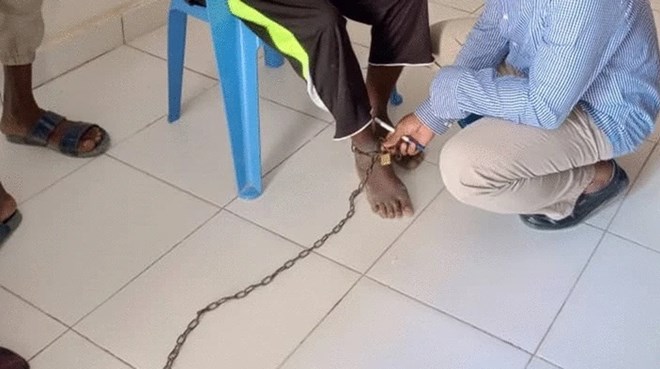
Monday September 9, 2024

A patient is chained at the ankle in a mental health center
Mogadishu (HOL) — Hodan Ali hasn't slept properly in years. The 32-year-old mother of three wakes up in terror almost every night, haunted by the sound of gunfire from Mogadishu's years of conflict. Like millions of other Somalis, Hodan is trapped in a mental health crisis worsened by decades of violence, stigma, and a lack of professional care.
A new study reveals that up to 90% of Somalis suffering from mental health conditions do not receive the help they need. Over 30 years of armed conflict, combined with repeated natural disasters and widespread use of khat—a stimulant linked to mental disorders—have resulted in high rates of depression, anxiety, and post-traumatic stress disorder (PTSD) among the population. "The concept of mental health is very new" said one of the study's psychiatrists.
This extreme shortage of professionals leaves most of the population without access to essential mental health care, forcing many to turn to traditional healers, who often attribute mental illnesses to spiritual causes, such as possession by jinn or black magic, delaying necessary medical intervention. These healers, though respected, usually lack the necessary training to manage complex mental health disorders.
The study also examines how cultural stigma surrounding mental health remains one of the largest obstacles to treatment. Many Somalis view mental illness through the lens of spirituality, believing that conditions like depression, schizophrenia, bipolar disorder, or psychosis are caused by jinn or black magic. This cultural perception significantly delays care, with the average time to seek professional help being more than three years. As a result, those who do seek help often arrive at healthcare facilities in severe psychological states.
Cultural norms play a significant role in how mental health is perceived and treated in Somalia. In a society where resilience is valued, particularly among men, admitting to mental illness is seen as a sign of weakness.
The psychological toll of Somalia's decades-long conflict is immense. In cities like Mogadishu, where explosions and armed clashes are common, the trauma of daily violence is palpable. One public health official remarked, "People live under constant stress and fear for their safety. The level of trauma in this country is staggering." The report also highlights khat addiction as a major driver of mental health disorders. Khat consumption, widespread in Somalia, has been linked to psychosis and exacerbates existing mental conditions. Hospitals in Mogadishu report that 94% of their mental health patients suffer from substance abuse-related disorders, primarily due to khat use.
Mental health experts involved in the study have called for immediate reforms to address the crisis. "The lack of trained professionals and the widespread stigma surrounding mental health issues are holding back efforts to address this growing problem," said a senior psychiatrist. He stressed the need for cultural change and increased resources to ensure that mental health care becomes accessible to all Somalis. The report also advocates for public education campaigns to reduce stigma and encourage early intervention. Another expert emphasized, "Without a shift in how mental health is perceived, we'll continue to see people suffer in silence, untreated and undiagnosed."
To combat this growing crisis, the report recommends integrating mental health services into Somalia's primary healthcare system. Currently, these services are only available in a few regions, leaving many communities without adequate access to care. The report highlights a promising initiative in Somaliland, where a "sin tax" on khat raised $2 million in 2022 to fund mental health services. Expanding such initiatives across the country could provide the financial boost needed for Somalia's underfunded healthcare system.
The study also suggests public education campaigns aimed at reducing stigma and encouraging more Somalis to seek professional mental health care.
International cooperation is also key, particularly with the Somali diaspora. The report calls for the diaspora's engagement to provide expertise, funding, and resources.